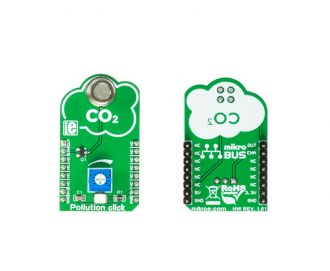
We strongly encourage users to use Package manager for sharing their code on Libstock website, because it boosts your efficiency and leaves the end user with no room for error. [more info]

Rating:
Author: MIKROE
Last Updated: 2019-03-11
Package Version: 1.0.0.1
mikroSDK Library: 1.0.0.0
Category: Gas
Downloaded: 5781 times
Not followed.
License: MIT license
Pollution click has high sensitivity to organic gases such as methanal, benzene, alcohol, toluene, etc. The click carries the WSP2110 VOC gas sensor with the detection range of 1~50ppm. Pollution click is designed to run on 5V power supply. It communicates with the target MCU over AN and RST pin on the mikroBUS line.
Do you want to subscribe in order to receive notifications regarding "Pollution click" changes.
Do you want to unsubscribe in order to stop receiving notifications regarding "Pollution click" changes.
Do you want to report abuse regarding "Pollution click".

Library Description
The library covers all the necessary functions to control Pollution click board. Pollution click communicates with the target board via analog ( AN ) pin. This library contains drivers for reading the ADC value of WSP2110 sensor.
Key functions:
Examples description
The application is composed of three sections:
void applicationTask()
{
valueADC = pollution_readADC();
Delay_100ms();
IntToStr( valueADC, logText );
mikrobus_logWrite( " ADC value: ", _LOG_TEXT );
mikrobus_logWrite( logText, _LOG_LINE );
mikrobus_logWrite( "-------------------", _LOG_LINE );
Delay_1sec();
}
Additional Functions :
Other mikroE Libraries used in the example:
ADCUART​ConversionAdditional notes and informations
Depending on the development board you are using, you may need USB UART click, USB UART 2 click or RS232 click to connect to your PC, for development systems with no UART to USB interface available on the board. The terminal available in all MikroElektronika compilers, or any other terminal application of your choice, can be used to read the message